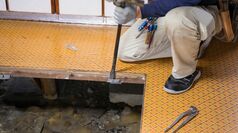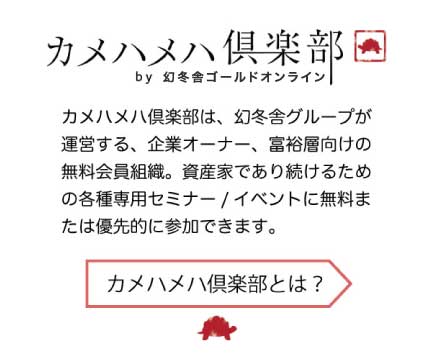<前回記事>英語で「頑張る/流行る/調べる/~しまくる/経験する」←これ全部、動詞「go」で表現できるって知ってた?
「come」:ひと言で表すと〈話の中心に、近付いてくる〉イメージ
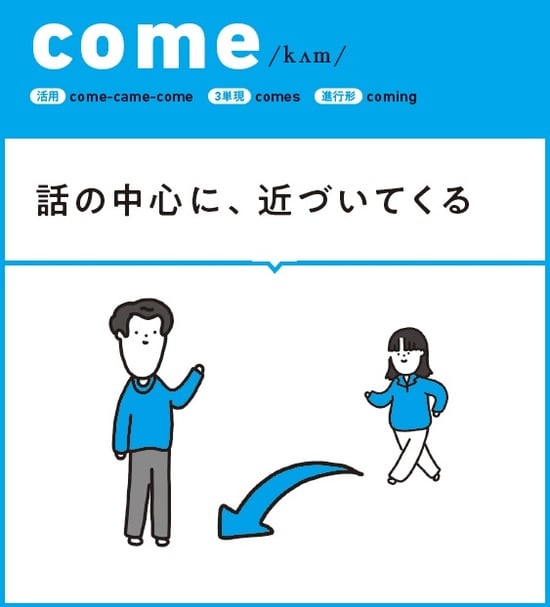
「come」の定義
【定義①】 来る、やってくる
〈例文〉My mom came to see me.(お母さんが私に会いに来た。)
【定義②】(相手のほうに)行く
〈例文〉I’m coming to your house right now.(今そっちの家に向かってる。)
【定義③】 届く、達する
〈例文〉Your total comes to 27 dollars.(合計27ドルになります。)
【定義④】 起こる、生じる
〈例文〉I’m ready for whatever comes next.(次に何が起ころうと準備はできている。)
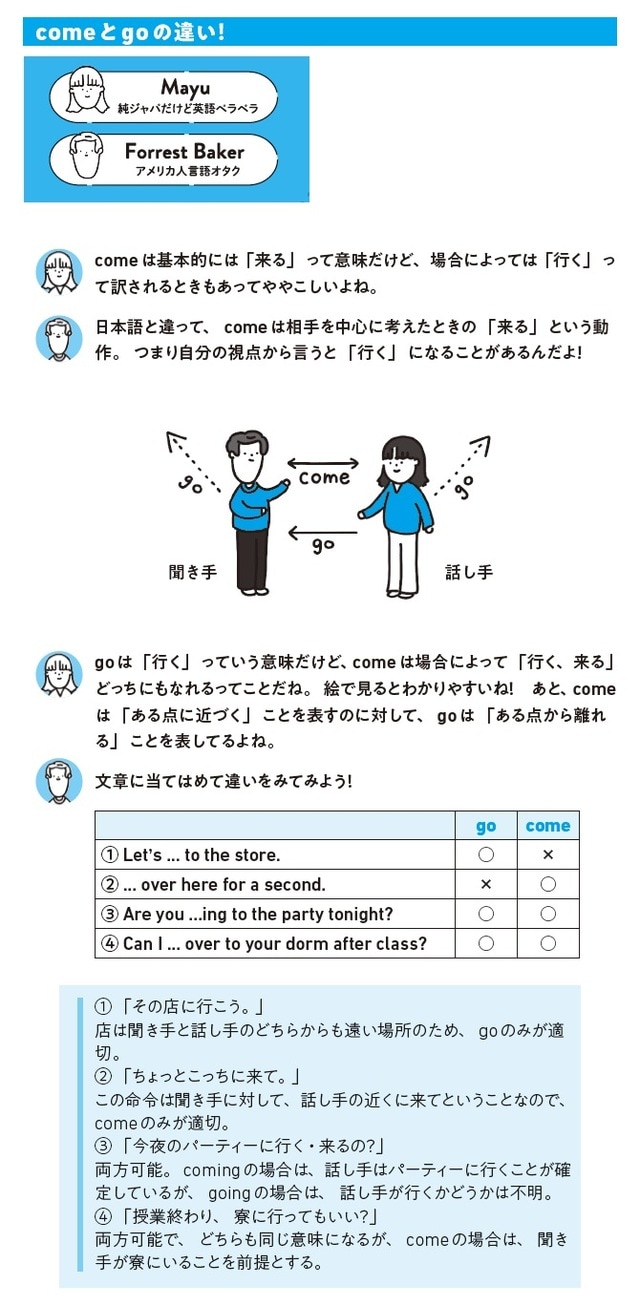
出所:Mayu、Forrest Baker共著『パパッと頭に入る 英語の動詞図鑑』(KADOKAWA)
ちょっと用事が…は「Something came up.」 comeを使った句動詞*
(*2語以上で一つの動詞の役割を果たす語句のこと。「動詞+副詞」「動詞+前置詞」「動詞+副詞+前置詞」の3パターンがある。)

◆come across sth(~に偶然出会う、~を偶然見つける)
⇒I came across an interesting article on the internet today.(今日ネットで興味深い記事を偶然見つけた。)
◆come across as sth(~と思われる、~に見える)
⇒I don’t want to come across as selfish.(自分勝手だと思われたくない。)
◆come after sb(~を追いかけてくる、追跡する)
⇒If you commit a crime, the police will come after you.(もし罪を犯したら、警察に追跡されるだろう。)
◆come along:
①一緒に来る・行く
⇒I’m going to the park after class today. You wanna come along?(今日放課後公園に行くんだ。一緒に来る?)
②(良い方向に)進む、捗る
⇒The project headed by the new team is coming along nicely.(新しいチームが率いるその計画は良い方向に進んでいる。)
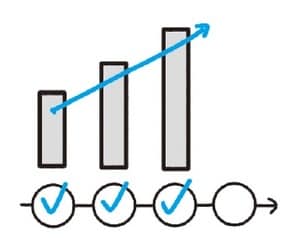
出所:Mayu、Forrest Baker共著『パパッと頭に入る 英語の動詞図鑑』(KADOKAWA)
◆come apart(壊れる、バラバラになる)
⇒The origami got wet and came apart in my hands.(折り紙が濡れて、私の手の上で壊れてしまった。)
◆come around(次第に受け入れる、考えを変える)
⇒She takes a while to open up to new people, but she’ll come around.(時間はかかるけど、彼女はいずれ初対面の人に心を開いてくれる。)
【超重要】◆come back(戻る)
⇒I came back home after class.(放課後私は家に帰った。)
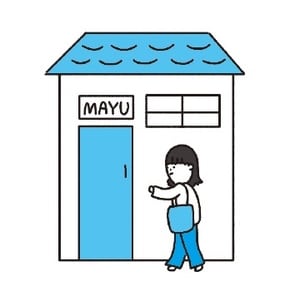
出所:Mayu、Forrest Baker共著『パパッと頭に入る 英語の動詞図鑑』(KADOKAWA)
◆come by sth(~に立ち寄る、~を訪れる)
⇒Forrest came by my classroom to say hi.(フォレストが私の教室に挨拶するために立ち寄ってくれた。)
◆come down with sth(~に感染する、~にかかる)
⇒I came down with a bad cold last winter.(私は去年の冬ひどい風邪をひいた。)
◆come from sth:
①~から来る
⇒I just came from the gym.(ちょうどジムから来たところです。)
②~に起源がある
⇒The English alphabet originally came from Phoenician.(英語のアルファベットは元々フェニキア語に起源がある。)
◆come in:
①入る
⇒Excuse me, can I come in?(すみません、入ってもよろしいでしょうか?)
②出勤する
⇒I can’t believe they made you come in two Sundays in a row.(君が二回連続で日曜日に出勤させられたなんて信じられないよ。)
◆come into sth(~の中まで入ってくる)
⇒A suspicious-looking man came into the store about an hour ago.(怪しい見た目の男性が約1時間前に店に入ってきた。)
◆come off(はずれる、とれる)
⇒I can’t wear that jacket anymore because the zipper came off.(ファスナーが取れたからそのジャケットはもう着れないや。)
◆come off as sth(~のように見える、思える)
⇒If you double text, you might come off as desperate.(もし連続でメッセージを送ったら、必死だって思われるかもよ。)
◆come on to sb(~に言い寄る)
⇒I think that guy was coming on to me during the meeting.(あの人、会議中に私に言い寄ってきてたと思うんだよね。)

出所:Mayu、Forrest Baker共著『パパッと頭に入る 英語の動詞図鑑』(KADOKAWA)
【超重要】◆come out:
①外に出る
⇒My brother never comes out of his room.(私の兄は部屋から全然出ない。)
②公開される、発売される
⇒Horror movies come out every year around Halloween.(毎年ハロウィーンの時期にホラー映画が公開される。)
③LGBTQ+であることを公表する
⇒My friend came out last year.(私の友達は去年、LGBTQ+だということを公表した。)
④(写真が)現像される、写る
⇒Wow, your wedding photos came out really well!(わお、結婚式の写真すごく良く出来上がってるね!)
◆come out with sth(~を売り出す、発表する)
⇒My favorite makeup brand just came out with a new eyeshadow palette.(私の好きな化粧品ブランドが新しいアイシャドウのパレットを発表した。)
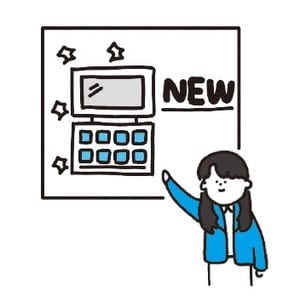
出所:Mayu、Forrest Baker共著『パパッと頭に入る 英語の動詞図鑑』(KADOKAWA)
◆come over:
①やってくる、近づいてくる
⇒Can you come over here for a minute and give me a hand?(ちょっとここに来て手を貸してくれない?)
②家にやってくる
⇒Mayu: Hey, you wanna come over to my dorm tonight to study for the test?(ねえ、今夜私の寮に来て、テストの勉強しない?)
Forrest: Sure!(いいね!)
◆come up:
①(突然)起こる
⇒Girlfriend: Are you still up for dinner tonight?(彼女:今夜のディナーはまだ行けそう?)
Boyfriend: Ah sorry, something came up...(彼氏:あぁ、ごめん。用事できちゃったんだ。)
②(話題が)出てくる、上がる
⇒Forrest: Do you know Tyler?(タイラーって知ってる?)
Mayu: No, but I’ve heard his name come up before.(いや、でも彼の名前が話題に出たのを聞いたことはあるよ。)
③昇る、出る
⇒The sun comes up really late in the winter.(冬は太陽が昇るのがかなり遅い。)
【超重要】◆come up with sth(~を思いつく、提案する)
⇒Do you have any ideas for what to write this essay about? I can’t come up with anything good.(このエッセイ、何について書くかアイデアある? 何も良いことが思いつかないんだよね。)

出所:Mayu、Forrest Baker共著『パパッと頭に入る 英語の動詞図鑑』(KADOKAWA)
「急げ!」は「Come on!」comeを使った慣用句
◆come in handy(持っていると便利である)
⇒A towel always comes in handy when you’re traveling.(旅行中は、タオルはいつでも役に立つ。)
◆Come on!(急げ、ついてきて)
⇒Come on! We’re gonna be late!(早く! 遅刻するよ!)
【著者】Mayu
国際基督教大学(ICU)卒。英検1級、TOEIC990点、TOEFL110点取得。高校3年時に、1年間ニュージャージー州に留学。大学では、言語教育とメディア・コミュニケーション・文化を二重専攻し、専門性を高めるため、アメリカのバーモント州に1年間の交換留学をする。現在は英語や留学についての情報をSNSで発信する傍ら、英語講師をメインに通訳や翻訳家としても活動。
【著者】Forrest Baker
アメリカ出身。ミドルベリー大学にて言語学を中心に日本学を専攻。在学中、国際基督教大学(ICU)に留学。日本語にどっぷりハマり、日本学の学位をもって卒業。卒業後は英語教育に2年間従事し、現在は日本で暮らしながら国際関係の仕事・翻訳業務に携わっている。2017年より日本在住。極度の言語オタク。










